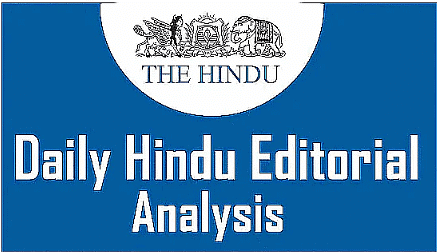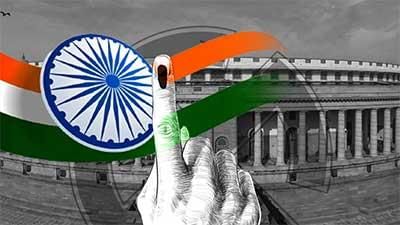The Hindu Editorial Analysis- 5th September 2023 | Current Affairs & Hindu Analysis: Daily, Weekly & Monthly - UPSC PDF Download

Tiers apart
Why in News?
The government has initiated steps towards achieving simultaneous Lok Sabha and Assembly elections in India. Former President Ram Nath Kovind will lead the committee responsible for this effort. A special parliamentary session has been called from September 18-22 to discuss this matter. Implementing "one nation, one election" poses significant legal challenges, including changes to the Constitution, new legislation, consensus among states, and addressing post-poll complications related to the fixed five-year term for legislative bodies.

Historical Background
- The concept of simultaneous elections in India dates back to at least 1983 when it was first proposed by the Election Commission. However, India initially conducted simultaneous elections to both the Lok Sabha (House of People) and State Legislative Assemblies in 1951-52, and this practice continued in the subsequent General Elections of 1957, 1962, and 1967.
- Unfortunately, the cycle of simultaneous elections was disrupted due to the premature dissolution of some Legislative Assemblies in 1968 and 1969. In 1970, the Lok Sabha itself was dissolved ahead of schedule, leading to fresh elections in 1971. Consequently, the First, Second and Third Lok Sabha were the only ones to enjoy full five-year terms.
- The frequent premature dissolutions and extensions of the Lok Sabha and State Legislative Assemblies' terms led to separate elections for these bodies, disrupting the cycle of simultaneous elections that had been established earlier.
Advantage of simultaneous election
The "One Nation One Election" concept offers several advantages:
- Control Over Election Expenses: It can help regulate election and party expenses. In the initial Lok Sabha elections in 1951-52, 53 parties participated with poll expenses of 11 crore rupees. In contrast, the 2019 elections saw 610 political parties, around 9,000 candidates, and an estimated poll expenditure of 60,000 crore rupees (as declared by ADR).
- Cost Savings: Implementing this concept would save public funds and alleviate the burden on administrative structures and security forces. It would ensure the timely execution of government policies and enable the administrative machinery to focus on development rather than election-related tasks.
- Informed Voting: Voters would have the opportunity to assess the policies and performance of both state and central governments more effectively. This would make it easier for voters to compare political parties' promises with their actual implementation.
- Enhanced Governance: It can address governance challenges by discouraging politicians from making short-term decisions for electoral gains, thus promoting decisions beneficial for the country in the long run.
Preparation Time: Conducting elections once every five years would provide more preparation time for all stakeholders, including political parties, the Election Commission of India (ECI), paramilitary forces, and civilians. Overall, "One Nation One Election" holds the potential to streamline the electoral process, improve governance, and optimize resource utilization.
Challenges of Simultaneous Election
Implementing "One Nation One Election" faces several challenges:
- Synchronization of Terms: To hold simultaneous elections, the terms of both the Lok Sabha and State Legislative Assemblies must align. Currently, some state assemblies have elections at different times, leading to variations in their terms. To achieve synchronization, constitutional amendments would be required, impacting Articles 83, 85, 172, 174, and 356.
- Constitutional Amendments: Modifying the terms of legislative bodies necessitates changes in key constitutional articles, such as Article 83 (Lok Sabha term), Article 85 (Lok Sabha dissolution), Article 172 (State Legislative Assembly term), Article 174 (State Legislative Assembly dissolution), and Article 356 (President's Rule). Additionally, amendments to the Representation of the People Act and related parliamentary procedures would be essential.
- Parliamentary Form of Government: India's parliamentary system mandates that the government is accountable to the Lower House (Lok Sabha or Legislative Assembly). If the government falls before completing its term, elections are imperative. Achieving "One Nation One Election" must address this inherent feature of the parliamentary form of government.
- Political Consensus: Convincing all political parties to support "One Nation One Election" is a formidable challenge. Different parties may have varying interests and concerns, making securing consensus on this significant electoral reform challenging.
Logistical challenges: associated with implementing "One Nation One Election" are as follows:
- Increased EVM and VVPAT Requirements: Currently, a single voting machine is used at each polling station. To conduct simultaneous elections, the Election Commission of India (ECI) would need to double the supply of Electronic Voting Machines (EVMs) and Voter Verified Paper Audit Trails (VVPATs) because each polling station would require two sets – one for the Legislative Assembly election and another for the Lok Sabha election.
- Additional Polling Staff: Conducting simultaneous elections would necessitate a larger pool of polling staff to manage both sets of elections simultaneously. This poses a recruitment and training challenge for the ECI.
- Logistics of Material Transport: Coordinating the transportation of election materials to polling stations, including EVMs, VVPATs, and other equipment, becomes more complex with simultaneous elections. Ensuring timely delivery and distribution to the right polling stations is critical.
- Enhanced Security Needs: Simultaneous elections would require heightened security measures, including an increase in Central Police Forces to maintain law and order at polling stations. Adequate security arrangements must be made to manage the dual electoral process effectively.
- Storage Challenges: The ECI already faces difficulties in storing EVMs after elections. With the need for a larger inventory of machines due to simultaneous elections, finding secure and suitable storage facilities becomes more pressing.
Addressing these logistical challenges is crucial for the successful implementation of "One Nation One Election" to ensure efficient and secure electoral processes.
Recommendations:
- The Law Commission of India recommended simultaneous elections to Lok Sabha and State Legislative.
- The 79th report of the Parliamentary Standing Committee on Law and Justice recommended a two-phase election schedule – one concurrent with Lok Sabha elections, the second in the mid-term of the Lok Sabha.
- The Election Commission has also extended its in-principle support for the simultaneous elections.
What are possible solutions?
Several solutions can be considered to address the challenges associated with "One Nation One Election" in India:
- Presidential Form of Government: One radical solution is transitioning to a Presidential form of government, where the President is not accountable to the House. In such a system, fixed election dates, similar to the United States, could be established for presidential and legislative elections, minimizing synchronization challenges.
- Switching to the Presidential form of government would mean altering the basic structure of the constitution
- Fixed Election Dates: Emulate the American model of fixed election dates for the President, Vice President, House of Representatives, and Senate. These fixed dates could be legally mandated, ensuring that elections occur at scheduled intervals, regardless of the parliamentary form of government.
- Alternative Leadership Selection: In the parliamentary system, if the government falls before completing its term, one solution is to invite the second or third leading person in the house or the leader of a political party to form the government. Alternatively, the House could be given the opportunity to elect its leader in such circumstances.
- Constitutional Amendment for Term Alignment: Amend the Constitution to align the terms of state legislative assemblies with that of the Lok Sabha elections. This would ensure that elections for both entities occur simultaneously. Additionally, synchronizing only the Lok Sabha and Rajya Sabha elections could be considered.
- Logistical Costs vs. Savings: While implementing "One Nation One Election" may entail some logistical costs, it is essential to consider the potential savings, such as reduced election expenditure. The net result could be cost-effective and efficient elections.
Ultimately, the choice of solution will depend on the Indian government's commitment to electoral reform and the ability to secure consensus among political parties for the necessary constitutional amendments and changes in election practices.
Conclusion
The concept of 'One India One Election' holds promise as a positive change, provided it is executed with meticulous attention to policies and regulations. Addressing the growing demand for skilled administrative staff and heightened security is crucial. Forming a dedicated group consisting of constitutional experts, think tanks, government officials, and political party representatives is essential to working out the intricate details of implementation. In a country where elections are celebrated as festivals, the transition to holding them once every five years nationwide would indeed be akin to a grand "Maha-Festival," consolidating the democratic process and reducing the administrative burden associated with frequent elections.
|
63 videos|5408 docs|1146 tests
|





















